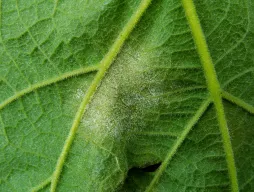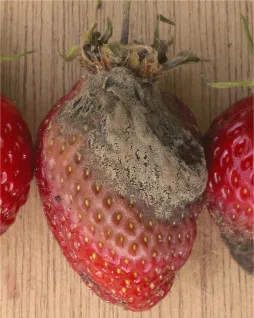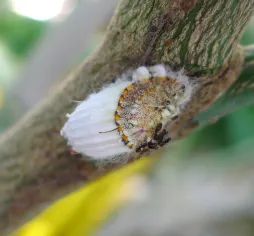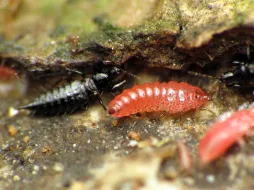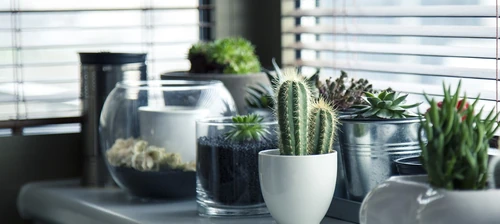Begonia ferox, a begonia with puffy foliage
Some Begonia ferox are sold under the name of Troll. A fitting name for this plant descended from Begonia rex and distinguished by its foliage halfway between acne gnome and dinosaur carapace.
How to recognize Begonia ferox?
A bushy perennial, Begonia ferox reaches a maximum height of 60 centimetres in all directions.
Begonia ferox is a hairy plant. White down covers its petioles and red stems.
Long trichomes also cover the underside and upper surface of the leaf blades. But that's far from the most curious aspect of the foliage! The asymmetrical leaves measure up to 20 centimetres long and 15 centimetres wide. Green and shiny at birth, they later bristle with brown bubbles withred tips.
In summer, clusters of pinkish-white or yellow flowers enhance the foliage.
Begonia ferox is toxic. The plant contains calcium oxalate, which causes nausea and vomiting if ingested. It can also cause skin irritation on contact. Keep your specimen out of reach of pets, and remember to wear gloves when pruning and repotting.
Our maintenance tips
Begonia 'Ferox like humidity but have fragile foliage. Rather than misting your plant, place its pot on a dish of moist clay balls.
Watering
Water when the soil is dry, for about three centimeters. Use room-temperature, non-calcareous water, preferably rainwater. When watering, avoid wetting the leaves.
Thirty minutes after watering, drain off any stagnant water in the saucer. It may rot the roots.
To improve humidity, place your Begonia rex 'Ferox' with your other plants or place its pot on a dish of moist clay balls.
Repotting
In spring, transfer your Begonia rex 'Ferox' to a larger pot, so that it can continue to grow.
Your Begonia 'Ferox likes it cramped. Re-pot when the roots escape from the pot or have colonized the entire space.
Choose a pot with holes two or three centimetres wider and deeper than the previous one. Pour a drainage layer (clay balls, gravel, small pebbles, etc.) in the bottom.
Top up with potting soil for green plants, enhanced with perlite or sand. Plant your Begonia rex 'Ferox' in the center and add substrate.
Top up with potting soil for green plants, enhanced with perlite or sand. Plant your Begonia rex 'Ferox' in the center and add substrate.
Fertilization
You can stimulate the development of your plant during its growth phase, in spring and summer, with fertilizer.
Dilute green plant fertilizer with water.
Prune
To encourage the growth of your Begonia 'Ferox, prune regularly.
Remove wilted flowers.
If you want your plant to keep a compact habit, don't hesitate to prune it. Cut above a node with a clean, sharp tool, such as secateurs or scissors.
Cutting
Cutting is carried out during the strong growth phase, generally in spring and early summer.
Take a fifteen-centimeter section of stem or liana with at least three leaves.
Pour a rich, well-draining substrate, such as potting soil for cuttings and seedlings, into a perforated pot. Mist the soil to moisten it.
Make a pilot hole and plant the petiole. Make sure the leaf is in contact with the soil.
Cuttings grow best smothered. Cover the pot with a translucent lid. Aerate for a few minutes a day to prevent rotting, and check that the soil remains moist. You can spray the soil, without wetting the leaves, to increase humidity.
Diseases / Threats
Information
| Family | Begonias - Begoniaceae |
| Type | Begonia - Begonia |
| Species | Royal Begonia - Begonia rex |
| Lifecycle | Perennial |
| Foliage | Evergreen |
| Exposure | |
| Substrat | |
| Planting methods |
In pots In tubs |
| Categories | |
| Tags |
Fritillary Toxic |
| Origin |
South Asia |
| Hardiness (USDA) | 11b |
| Leaf color |
|
| Flower colors |
|
Discover plants from the same family
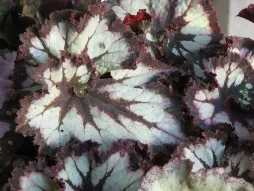
Royal Begonia
Discover
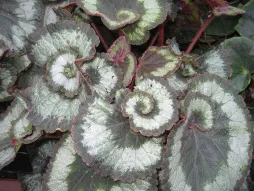
Begonia 'Escargot
Discover

Begonia maculata
Discover
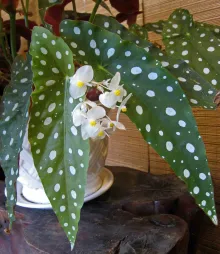
Begonia maculata 'Wightii'
Discover












